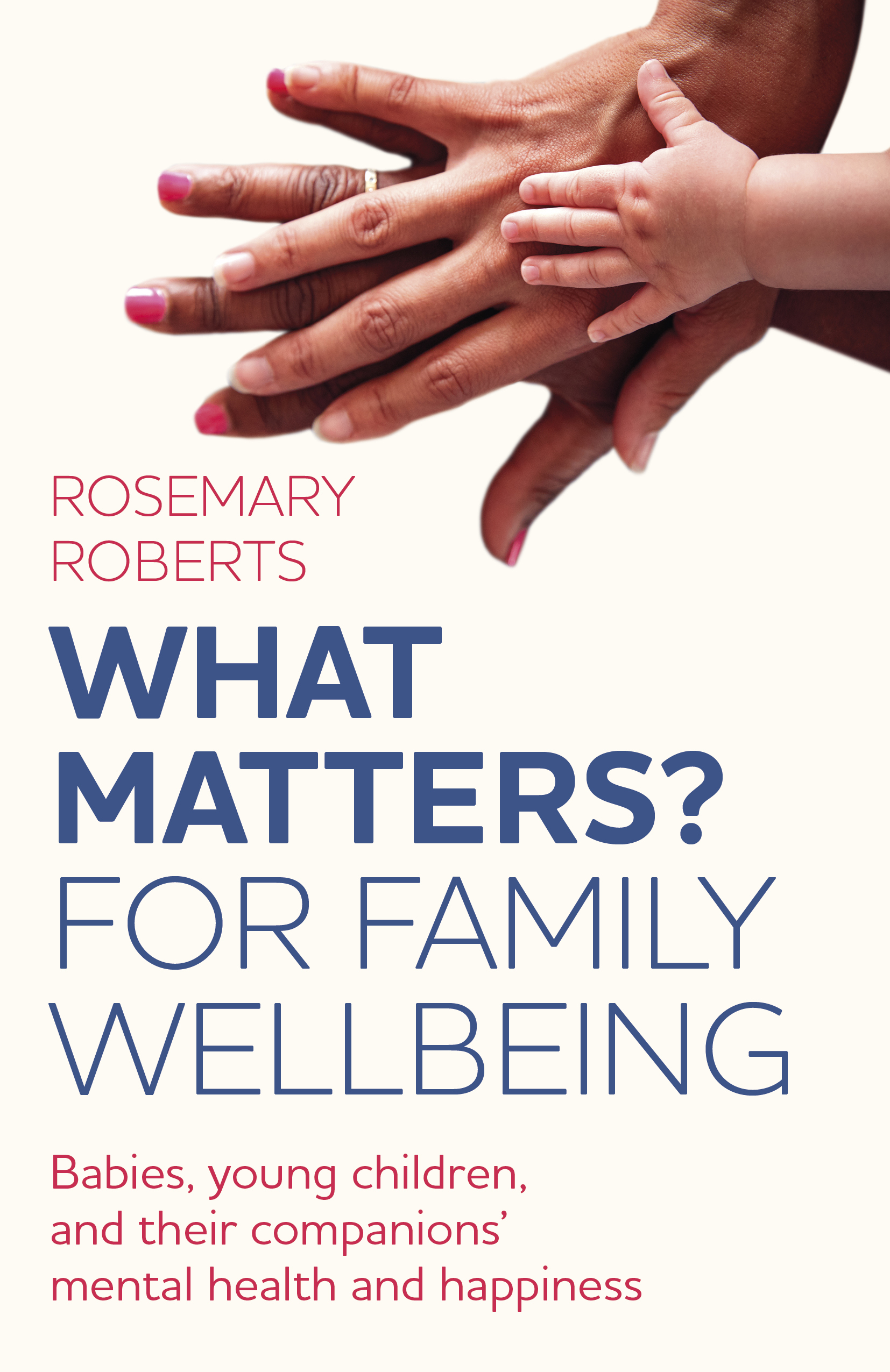- Home
- Editor's Notes
- Current Issue
- Riki Reflects
- Spiritual Traveler
- Starz Emporium
- Classifieds
- Advertise with Us
- Submissions
- Awards
- About Us
- Contact Us
Mental Health and Happiness
By Dr Rosemary Roberts
 Mental Health and Happiness
by Dr Rosemary Roberts ‘WHAT MATTERS? For family wellbeing Babies, young children, and their companions’ (https://www.o-books.com) A new baby has arrived! For parents, grandparents, extended family and friends, this is such an important time. It can be a hard time as well, especially with a first baby ………. in the tangle of conflicting convictions and advice, what matters? ‘WHAT MATTERS? for family wellbeing’ is short, easy to read, timely and practical. It is a small book about a big subject, the long-term health and happiness of babies, young children and their companions. Based on widely researched evidence about development in the earliest years from birth, it highlights the importance of companionable relationships in families. ‘What Matters?’ offers a way for parents and carers to decide what matters to them, in everyday life at home. The needs of babies and young children themselves come first, a perspective often ignored in the childcare debate. Importantly it is also about what matters for parents and carers themselves, with many ideas to make life better and easier for everyone. These days when so much prevents people connecting with each other, ‘What Matters?’ is all about restoring and building those connections, right from the start. The basic theme that runs throughout the book, and that threads all the other themes together, is companionship. It is about the depth and quality of babies and young children’s relationships with their ‘companions’: the people they see often and know well, with whom they share love or affection. This indicates a very wide readership, not just parents and primary carers; but also grandparents (so often in the caring role these days) and other family members and friends regularly involved with babies and young children. “Being a companion is not so much about what we do, but how we do things together, day by day. Being good enough companions is about living ordinary life, companionably together”.
But what things can we do with babies and young children? Here are companionable ways of doing things; and nothing special, just everyday life together. As it happens these ways do not involve spending money, a fortunate factor in a world where so many families are struggling financially. There is much that parents and carers already know or can easily find out, especially about babies and children’s physical development and what to do if they are unwell. ‘What Matters’? is not about looking up what to do in a crisis. Instead, it offers a way to consider a generally consistent approach, giving the confidence to find ways through the sometimes contradictory advice about what to do for the best. ‘Belonging’ is a fascinating theme in ‘What Matters’? For the youngest children, gradually growing a sense of belonging is so important. ‘What Matters’? describes how identity and belonging develop in a kind of mirroring process. Children need a sense of their own identity to get a feeling for where they belong. Belonging and behaviour are strongly connected: not separate, but like two sides of the same coin. ‘What Matters’? explains why and how belonging and behaviour are often interdependent, in ways that make life with the youngest children so much easier. In order to be accepted and to carry on belonging in their family, their nursery or school, and later in adult relationships, they realise how to behave and how not to behave. “Feeling safe and secure matters throughout life, not just in childhood. Young children’s feelings of safety and security come from the way companions deliberately nurture their sense of belonging and pay attention to their fears in the early years. The other side of the belonging-and-boundaries coin involves the expectations about behaviour that are a consequence of belonging. It can be very helpful when young people understand this too. Families and companions who have made a lasting habit of saying yes as often as possible, and saying no firmly on the occasions when it’s really needed, know that fewer frustrations come along.”
What matters about learning? When companions understand the importance of the positive learning attitudes that babies are born with, they can make an enormous difference to learning outcomes throughout life. Here is how the process begins: “At the start, babies’ favourite things to play with, their best ‘toys’, are us. As well as liking us being with them, they love it when we let them literally play with us, so that they can explore to their hearts’ content. Our knuckles make such good teething rings, adults make much funnier noises than any rattle, and almost immediately babies learn that they can lead the way. For instance when they smile, we will smile back; and when they bang with their hands, so (gently) do we. It is the baby who takes charge.”
Young children learn so much through play. ‘What Matters?’ explains how this works, and how understanding about their play patterns can make such a fantastic difference to having fun at home. Sometimes a pattern seems very strong in a child, and we can see it in how they play. At other times patterns seem to fade, vary in strength, or be joined or even replaced by different ones. Some patterns can sometimes cause havoc in everyday life at home, but not so much if we understand them. ‘What Matters?’ explains how to recognise them, and how to make the most of them. Babies and young children experiencing these kinds of satisfying playtimes are laying down the foundations for contented life-long learning. The chapter about things to do at home suggests many companionable activities with children, involving minimal expenditure. Learning from the children themselves about their favourite times with companions, there are suggestions about what the natural world means for children, about why they are so keen to help with grown-up things (very important), and about ‘old friends’ – not just grandparents, but favourite songs, rhymes, books and even words they love to hear. There are sections about food with small children (no need for a battlefield), about going out without stress, about the pros and cons of screens, and about the joy of slowing down. Children can thrive and have fun helping, sharing and playing with the people they know and love best, doing things that matter. Towards the end there is a chapter on companions' wellbeing, especially mothers. During the first months, things can get tough. Even just one or two of the suggestions about making things better might help, but maybe nothing does. Becoming a mother can be a bit like being in a tumble dryer of emotions whirling relentlessly round and round. It’s a very normal reaction to feeling depleted physically, and to being suddenly in charge of a precious and completely helpless new life. Thinking about what matters both for babies and adults at this time helps with being good enough companions. And looking ahead to the future? Toddlers grow into teenagers, and toddlers and teenagers have something fundamental in common that tends to influence everything they do. A fascinating but little-known association between the lives of toddlers and the roller-coaster for teenagers is another useful explanation in this timely, practical and easy-to-read little book about what matters for the natural world and families’ mental health and happiness. As we look ahead, what matters more than that? ‘WHAT MATTERS? For family wellbeing by Dr Rosemary Roberts is available from https://www.o-books.com or from wherever books are sold. READ HERE > https://www.collectiveinkbooks.com/o-books/our-books/what-matters-family-wellbeing |
Share this article with friends!
|
Copyright © 1998 - 2025 Mystic Living Today All rights, including copyright, in the content of these Mystic Living Today web pages are owned or controlled for these purposes by Planet Starz, Inc. Terms of Service Disclaimer and Legal Information For questions or comment, contact Starzcast@mysticlivingtoday.com. Reproduction of this page in any form is not allowed without permission of the author and the owner of this site. All material on this web site, including text, photographs, graphics, code and/or software, are protected by international copyright and trademark laws. Unauthorized use is not permitted. You may not modify, copy, reproduce, republish, upload, post, transmit or distribute, in any manner, the material on this web site. Unless permissions is granted. |



